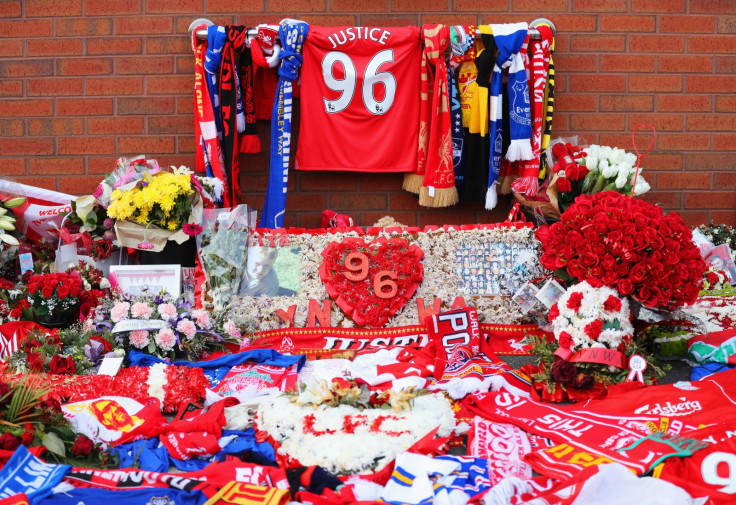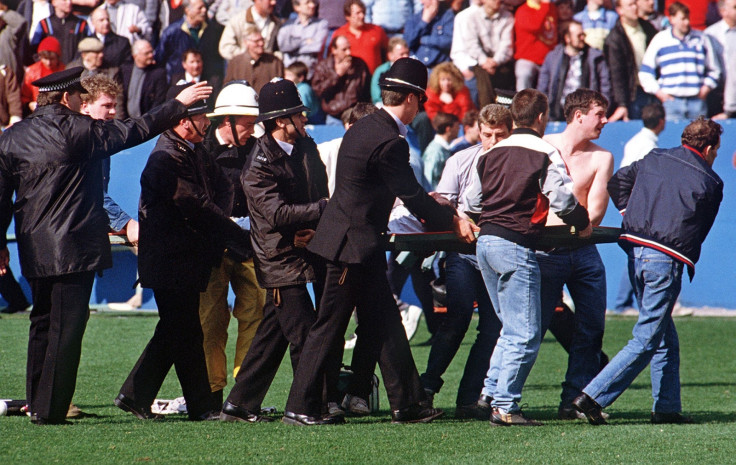Hillsborough disaster: Criminal charges and explanations for six individuals in full
Full statement from CPS announcing who is facing criminal charges over 1989 tragedy.
Six people, including four former South Yorkshire Police officers, have been charged in connection with the 1989 Hillsborough Disaster, in which 96 Liverpool fans were killed.
Among those who have been charged including David Duckenfield, who was the Match Commander for South Yorkshire Police on the day of the disaster.
He is due to appear in court accused of the manslaughter of 95 of those who died. Duckenfield has not been charged with the alleged manslaughter of Tony Bland, the 96th casualty, as he died almost four years later.
The Crown Prosecution Service announced that the others who face criminal charges in connection to the disaster are:
- Graham Henry Mackrell, who was Sheffield Wednesday Football Club's company secretary and safety officer at the time of the disaster in 1989
- Peter Metcalf, the solicitor acting for the South Yorkshire Police during the Taylor Inquiry and the first inquests
- Former Chief Superintendent Donald Denton of South Yorkshire Police
- Former Detective Chief Inspector Alan Foster of South Yorkshire Police
- Norman Bettison, a former officer with South Yorkshire Police and subsequently Chief Constable of Merseyside and West Yorkshire Police
All defendants except Duckenfield will appear at Warrington Magistrates' Court on 9 August 2017 to face the charges.
Below are the full explanations for the charges against the suspects from the CPS.
The Crown Prosecution Service (CPS) has considered two substantial files of evidence from Operation Resolve (OR) and the Independent Police Complaints Commission (IPCC) in respect of 15 and six suspects respectively. The suspects referred to the CPS included individuals and organisations. The offences referred for consideration include gross negligence manslaughter, misconduct in public office, doing acts tending and intending to pervert the course of justice, health and safety at work and safety of sports grounds offences.
Operation Resolve investigated the events of the 15th April 1989 when 96 Liverpool fans were tragically killed as the result of overcrowding in the central pens at the Leppings Lane end of the Hillsborough football stadium. The IPCC investigated the aftermath. In particular they looked at the conduct of South Yorkshire Police (SYP) and carried out an investigation into whether anyone was responsible for a 'cover up' of the true events and if witness statements were altered in such a way to amount to a criminal offence. The CPS team and senior counsel have been advising in respect of these matters from an early stage.
Following thorough investigations and careful review of the evidence in accordance with the Code for Crown Prosecutors, I have decided that there is sufficient evidence to charge six individuals with criminal offences.

I have found that there is sufficient evidence to charge former Chief Superintendent David Duckenfield, who was the Match Commander on the day of the disaster, with the manslaughter by gross negligence of 95 men, women and children. We will allege that David Duckenfield's failures to discharge his personal responsibility were extraordinarily bad and contributed substantially to the deaths of each of those 96 people who so tragically and unnecessarily lost their lives. The offence clearly sets out the basis of those allegations. We are unable to charge the manslaughter of Anthony Bland, the 96th casualty, as he died almost four years later. The law as it applied then provided that no person could be guilty of homicide where the death occurred more than a year and a day later than the date when the injuries were caused. In order to prosecute this matter, the CPS will need to successfully apply to remove the stay imposed by a senior judge (now retired) at the end of the 1999 private prosecution when David Duckenfield was prosecuted for two counts of manslaughter by gross negligence previously. We will be applying to a High Court Judge to lift the stay and order that the case can proceed on a voluntary bill of indictment.

Graham Henry Mackrell, who was Sheffield Wednesday Football Club's company secretary and safety officer at the time, is charged with two offences of contravening a term of condition of a safety certificate contrary to the Safety of Sports Grounds Act 1975 and one offence of failing to take reasonable care for the health and safety of other persons who may have been affected by his acts or omissions at work under the Health and Safety at Work Act 1974. These offences relate to alleged failures to carry out his duties as required.
Peter Metcalf, who was the solicitor acting for the South Yorkshire Police during the Taylor Inquiry and the first inquests, is charged with doing acts with intent to pervert the course of public justice relating to material changes made to witness statements. Mr Metcalf, an experienced solicitor, was instructed by Municipal Mutual Insurance to represent the interests of the force at the Taylor Inquiry and in any civil litigation that might result from the Hillsborough Disaster. He reviewed the accounts provided by the officers and made suggestions for alterations, deletions and amendments which we allege were directly relevant to the Salmon letter issued by the Taylor Inquiry and for which there appears to be no justification.
Former Chief Superintendent Donald Denton and former Detective Chief Inspector Alan Foster are similarly charged for their involvement in the same matter. It is alleged that Donald Denton oversaw the process of amending the statements and in doing so, he did acts that had a tendency to pervert the course of public justice and we will say that Alan Foster was central to the process of changing the statements and took action to do so.
Former Chief Constable Norman Bettison is charged with four offences of misconduct in public office relating to telling alleged lies about his involvement in the aftermath of Hillsborough and the culpability of fans. Given his role as a senior police officer, we will ask the jury to find that this was misconduct of such a degree as to amount to an abuse of the public's trust in the office holder.
The defendants, other than David Duckenfield, will appear at Warrington Magistrates' Court on 9 August 2017.

May I remind all concerned that criminal proceedings have now commenced and of the defendants' right to a fair trial. It is extremely important that there should be no reporting, commentary or sharing of information online which could in any way prejudice these proceedings.
In relation to six other police officers who were referred as suspects in respect of their conduct in planning for the match or on the day, there is insufficient evidence for a realistic prospect of conviction. I have concluded that whilst there is evidence of failure to meet the standards of leadership rightly expected of their respective ranks, there were no acts or omissions capable of amounting to gross negligence manslaughter or 'an abuse of the public's trust' to the required criminal standard for an offence of misconduct in public office. I also considered administration of justice offences against some of these officers. However, the evidence did not establish either a tendency to pervert the course of public justice, nor an intention to pervert the course of public justice to the required criminal standard. Neither did the material considered establish sufficient evidence, as required for the purposes of perjury, that statements were made on oath which the author knew to be false or did not believe to be true.
I have decided not to prosecute the company which was the legal entity of Sheffield Wednesday Football Club at the time as it only now exists on paper. There are no directors or others listed who form the company and therefore no-one who can give instructions to answer any criminal charge or enter a plea. Even if the company were to be prosecuted and found guilty in these circumstances, there could be no penalty as it does not have any assets with which to pay a fine.
For legal reasons, we cannot prosecute the South Yorkshire Metropolitan Ambulance Service and there is insufficient evidence of a criminal offence against the two most senior employees referred for consideration. There is, however, sufficient evidence of a health and safety breach against one junior ambulance employee, although it is 'non causative' which means that it cannot be directly connected to any particular death. As we cannot prosecute the ambulance service or the more senior employees and the offence carries a maximum penalty of a fine, I have decided that it is not in the public interest to prosecute the junior officer after this significant period of time when the likely outcome would be a nominal penalty.
Finally, in relation to Operation Resolve, the Football Association (FA) was also considered in relation to the day's events. Its conduct was assessed against the Safety of Sports Grounds Act and the Health and Safety at Work etc. Act 1974. While I considered that it was a 'responsible person' for the purposes of the Safety of Sports Grounds Act, there was insufficient evidence to establish that any breach of the safety certificate could be placed within the responsibility of that organisation, and thereby raise a burden on it as a defendant to establish a due diligence. Equally, for the purposes of the Health and Safety at Work Act, the evidence did not establish that, in the conduct of its undertaking, the FA contributed to a material risk to safety. As a result, in each instance, there was not a realistic prospect of a conviction against them. In the particular circumstances, it also followed that there was insufficient evidence against any employee of that organisation under either Act.

In respect of the other suspects referred for consideration of criminal offences arising from the IPCC investigation into the statement changing, there is insufficient evidence to prove an intention to pervert the course of public justice.
It is not the function of the CPS to decide whether a person is guilty of a criminal offence, but to make fair, independent and objective assessments about whether it is appropriate to present charges for the criminal court to consider. My assessment of the case is not in any sense a finding of, or implication of, any guilt or criminal conduct. It is not a finding of fact, which can only be made by a court, but rather an assessment of what it might be possible to prove to a court, in accordance with the Code for Crown Prosecutors.
There is a further IPCC file into the conduct of the West Midlands Police but additional investigative work was required in respect of this. Additionally, just this week, the IPCC has referred two further suspects which are unconnected to the matters sent to us in January. These files are subject to ongoing consideration by the CPS and we will announce our decisions in due course.
© Copyright IBTimes 2025. All rights reserved.





















